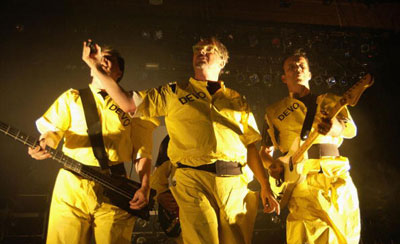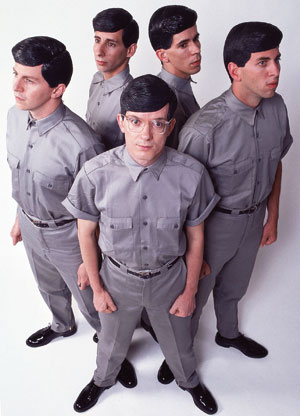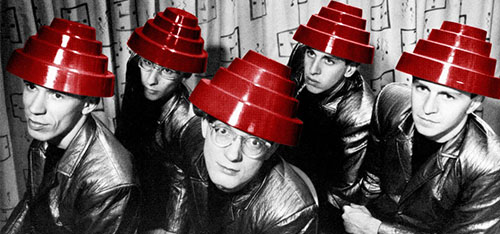Devo gained a new level of visibility with 1980's Freedom of Choice which included their best-known hit,
"Whip It", which quickly became a Top 40 hit. The album moved to an almost completely electronic sound,
with the exception of acoustic drums and Bob 1's guitar. The tour for "Freedom of Choice"
featured the band performing in front of large custom light boxes which could be laid on their back to form a second,
smaller stage during the second half of the set. Other popular songs from "Freedom of Choice" were "Girl U Want,"
the title track (both of which had popular music videos, along with "Whip It"), and "Gates of Steel".
Devo made two appearances on the TV show Fridays in 1980, as well as on Don Kirchner's Rock Concert, American Bandstand, and other shows.

The band remained popular in countries such as Australia,
where the nationally broadcast 1970s–1980s pop TV show Countdown was one of the first programs in the world to broadcast their video clips.
They were given consistent radio support by Sydney-based noncommercial rock station Double Jay (2JJ) and Brisbane-based independent community station Tripple Zed (4ZzZ), two of the first rock stations outside America to play their recordings.
The late-night music program Nightmoves aired The Truth About De-Evolution. This paid off, as in August 1981,
they found commercial success in Australia when their Devo Live E.P. spent 3 weeks at the top of the Australian charts.
In 1982, they toured Australia and appeared on the TV show Countdown.
In 1981, Devo contributed a cover of "Working in the Coal Mine," recording during the Freedom of Choice sessions,
to the film Heavy Metal. "Coal Mine" would be a pack-in bonus single with their 1981 release, New Traditionalists.
This album brought a new look for Devo, who wore self-described "Utopian Boy Scout uniforms"
topped with a plastic "New Traditionalist Pomp," a plastic half-wig modeled on the hairstyle of John F. Kennedy.
Among the singles from the album was "Through Being Cool," written as a reaction to their newfound fame from "Whip It,"
an attack on their new fans that misinterpreted the song—and Devo's—message.
The album's accompanying tour featured the band performing an intensely physical show with treadmills and a large Greek temple set.
Oh, No! It's Devo followed in 1982. Produced by Roy Thomas Baker, the album featured a darker,
more sinister sound than its predecessors. According to Gerald Casale,
the album's sound was inspired by reviewers calling them "fascist clowns" in articles.
The album's tour featured the band performing seven songs in front of a 12-foot high rear-projection screen with synchronized video,
an image recreated using blue screen effects in the album's accompanying music videos.
Devo also contributed two songs, "Theme from Doctor Detroit" and "Luv-Luv" to the 1983 Dan Aykroyd film Doctor Detroit,
and produced a music video for "Theme from Doctor Detroit" featuring clips from the film with live action segments.
Devo released their sixth album, Shout, in 1984 to mixed reviews.
The album has been criticized for its overuse of the Fairlight CMI synthesizer, and weak songwriting.
However, the band's cover of the Jimi Hendrix classic "'Are You Experienced?" and the accompanying music video received some praise.
Following the commercial failure of Shout, Warner Bros. dropped Devo from their label.
Shortly after, claiming to feel creatively uninspired, Alan Myers left the band.
This caused the band to abandon the plans for a "Shout" video LP, as well as their tour for the album.
During the interim, Mark Mothersbaugh began composing music for the TV show Pee-Wee's Playhouse,
and released an elaborately packaged solo cassette, Musik for Insomniaks, which was later expanded and released as two CDs in 1988.

In 1987, Devo reformed with new drummer David Kendrick, formerly of Sparks.
Their first project was a soundtrack for the flop horror film Slaughterhouse Rock, starring Toni Basil.
Devo had previously collaborated with Basil on her 1982 album Word of Mouth.
The band released Total Devo in 1988 on Enigma Records. This album included two songs used in the Slaughterhouse Rock soundtrack.
The song "Baby Doll" was used in the film Tapeheads, with newly recorded Swedish lyrics,
and was credited to (and shown in a music video by) a fictitious Swedish band called Cube-Squared.
Devo followed this up with a world tour, and released the live album Now It Can Be Told: DEVO at the Palace.
However, Total Devo was not a commercial success, and received poor critical reviews.
In 1989, members of Devo were involved in the project Visiting Kids, releasing a self-titled EP on the New Rose label in 1990.
The group featured Mark's then wife Nancye Ferguson, as well as David Kendrick, Bob Mothersbaugh, and his daughter Alex Mothersbaugh.
Their record was produced by Bob Casale and Mark Mothersbaugh; Mark also co-wrote some of the songs.
Visiting Kids also appeared on the soundtrack to the film Rockula, as well as on the Late Show with David Letterman.
A promotional video was filmed for the song "Trilobites".
The year 1990 saw the release of Smooth Noodle Maps, which would be Devo's last album for twenty years.
It, too, was not a commercial success. Devo launched a European concert tour, but poor ticket sales caused it to be ended early.
The band had a falling out soon after, but played two shows in 1991 before breaking up.
Around this time, members of Devo appeared in the film Spirit of '76, except for Bob Mothersbaugh.
Posthumously, two albums of demo recordings from 1974 to 1977—Hardcore Devo: Volume One (1990) and Hardcore Devo: Volume Two (1991)
—were released on Rykodisc, as well as an album of early live recordings, DEVO Live: The Mongoloid Years.
Following the split, Mark Mothersbaugh started Mutato Muzika, a commercial music production studio,
taking with him Bob Mothersbaugh and Bob Casale. The former works as a composer, and the latter as a recording engineer.
David Kendrick also worked at Mutato for a period during the early 1990s.
Mark has gained considerable success in writing and producing music for television programs
(starting with Pee Wee's Playhouse and perhaps most famously with Rugrats), video games, cartoons, and movies
(notably working alongside director Wes Anderson). Gerald Casale began a career as a director of music videos and commercials.
He has worked with bands including Rush, Silverchair, and the Foo Fighters.
Also, in the wake of Devo's demise, Bob Mothersbaugh attempted to start a solo career with The Bob I Band,
recording an album that was never released. The tapes for this are now lost, though a bootleg of the band in concert has surfaced.
In 1995, Devo reappeared with a new recording of "Girl U Want" on the soundtrack to the movie Tank Girl.
In January 1996, Devo performed a reunion concert at the Sundance Film Festival in Park City, Utah.
The band performed on part of the 1996 Lollapalooza tour in the rotating Mystery Spot,
with a setlist largely composed of material from their heyday between 1978 and 1982.
lso in 1996, Devo also released a multimedia CD-ROM adventure game, The Adventures of the Smart Patrol with Inscape.
The game was not a success, but the Lollapalooza tour was received well enough to allow Devo to return in 1997 as a headliner.
Devo would perform off and on from 1997 on.










